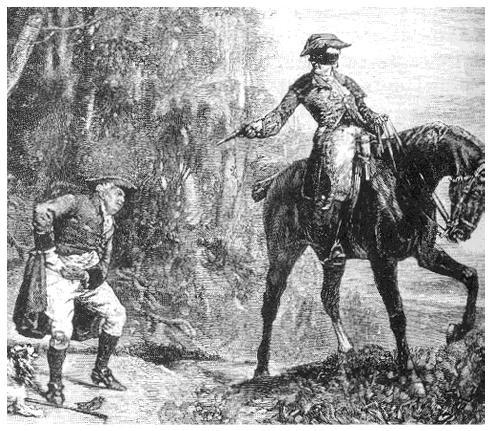
2 minute read
Afraid of the dark Highwaymen of the 1800s by local historian Mark Phillips
on condition that he did not move until the bandit was out of sight. He later claimed that he was taken by surprise and was unable to get close enough to use his cudgel.
However, the authorities did have a suspect in James Allen, a known army deserter and a native of the small parish of Graffham, near Petworth. James was under suspicion as it was noticed that he and his black mare were never seen on the nights of the hold-ups and that he always appeared to have plenty of money, even though he was not known to work.
Advertisement
There was a time during the first years of the 1800s when many people in the Arundel area were afraid to travel at night due to highwaymen holding up coaches and robbing individuals.
It became so bad that in 1807, a ‘troop of horsemen’ was raised to patrol roads in the local area, especially in the nearby Whiteways area where most of the hold-ups had occurred.
The dense woodland in this area was a perfect setting for armed robbers and masked men on horseback. Although the horsemen kept watch over the area at night, the robberies continued; sometimes very close to the areas they were patrolling.
It was thought that there must be several robbers carrying out these attacks, sometimes on horseback and other times on foot, but the robbers always had their faces covered with black masks and all worked alone.
The story goes on to say that a large, burly Arundel butcher jeered at his neighbours’ fears saying that all one needed was courage and a large stick with a heavy knob. He claimed that with such a weapon he would ‘not care a damn’ for the bandit.
Unfortunately for him, the butcher was armed as such during one of his regular daily journeys when he encountered the robber. After handing over his valuables, he was only permitted to live
However, James Allen made a terrible error in November 1807, as for some reason he departed from his usual pattern and method. At about noon on the first Sunday in November, without a mask or a horse, he held up elderly Mr Rhoades on the main road out of Graffham and stole his gold watch and money.
Several of the mounted men quickly arrived and went in chase of the culprit. One of the riders, Capt. Sargent, a military man on leave, saw a suspicious-looking man enter the wood and gave chase.
Catching up with the man, he was overheard by a nearby shepherd to say, ‘Ah, Jem, I have found you. I don’t want your life, but you must surrender yourself.’ Seconds later a shot was heard, but it was the young captain who fell down from his horse, dead.
As the light was failing, the search party agreed to continue the pursuit in the morning. At daybreak, many others turned out to join the hunt and were assisted by the local Militia. Eventually James Allen was cornered and shot dead by one of the search party while preparing to put up a fight to the end.
He was buried in Heyshott churchyard in the parish where he was cornered. The grave, although without a tombstone, is still known to this day.
Practically all local robberies ceased at the death of James Allen, with his confederates taking fright and leaving the district in peace.









